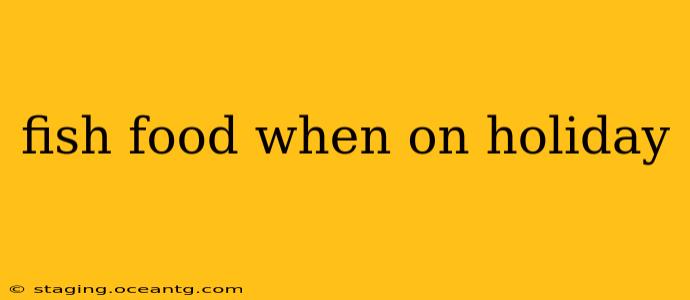Going on holiday shouldn't mean neglecting your beloved fish! Proper planning ensures their well-being while you're away, preventing stress and potential health issues. This guide will walk you through various options for fish food while you're on holiday, addressing common concerns and helping you choose the best solution for your specific needs.
How Long Can Fish Go Without Food?
This is a crucial question, and the answer depends entirely on the type of fish you have. Hardy species like goldfish can tolerate a few days without food, while more delicate tropical fish need more frequent feeding. Generally, most fish can survive 3-5 days without food, but longer periods can lead to starvation and weaken their immune systems, making them susceptible to disease. The size of your fish also matters; smaller fish need more frequent feeding than larger ones.
What Are My Options for Fish Food While on Holiday?
Several methods can keep your fish fed while you're away:
1. Automatic Fish Feeders: The Most Convenient Option
Automatic fish feeders are a fantastic solution for longer holidays. These devices dispense food at pre-programmed intervals, ensuring consistent feeding throughout your absence. They come in various models, from simple timers to more sophisticated ones with programmable feeding schedules and even multiple food dispensers.
Pros: Convenient, consistent feeding, suitable for longer trips. Cons: Initial investment cost, potential for malfunctions (though reliable brands minimize this risk).
2. Vacation Fish Food Blocks: Easy and Reliable for Shorter Trips
Vacation fish food blocks are designed to slowly dissolve in the water, providing a consistent food source over several days. These are ideal for shorter trips and generally safe for most fish species. However, always check the instructions to make sure the block is appropriate for your fish's size and dietary needs.
Pros: Simple, cost-effective for shorter absences. Cons: Less precise control over feeding amounts than automatic feeders; may not be suitable for all fish types or tank sizes.
3. Asking a Friend or Neighbor: A Reliable Human Solution**
Enlisting a friend, family member, or neighbor to feed your fish is a dependable method, especially if you're only gone for a few days. Ensure you provide clear instructions on feeding amounts, schedules, and any special requirements for your fish.
Pros: Personal care, allows for observation of fish health. Cons: Relies on another person's availability and responsibility; not suitable for longer trips.
4. Slow-Release Food Pellets: A Balanced Approach**
Some fish food brands offer slow-release pellets designed to gradually dissolve in the water, providing a sustained food source. These are a good middle ground between blocks and regular feeding, often suitable for a few days.
Pros: Better control than blocks, gentler release than some faster dissolving pellets. Cons: Might not be ideal for longer trips, ensure suitability for your fish type.
How Much Food Should I Leave?
Overfeeding is as dangerous as underfeeding. Always err on the side of caution and leave slightly less food than you normally would. A slightly hungry fish will be fine for a short period, while an overfed fish risks water quality issues.
What If I'm Going Away for an Extended Period?
For extended holidays, automatic feeders are your best bet. Consider having a backup plan, like a neighbor checking in, in case of a power outage or feeder malfunction.
What If My Fish Need Special Diets?
If your fish have specific dietary requirements, such as a need for live food or specialized pellets, you'll need to tailor your holiday feeding plan accordingly. Consult with an expert at your local pet store or a veterinarian experienced with aquatic animals.
Can I use a slow-release food block for tropical fish?
Yes, slow-release food blocks are a viable option for tropical fish, but choose a block specifically formulated for them. Some blocks contain ingredients that may not be suitable for all types of fish. Always read the product instructions carefully before using.
By carefully considering your fish species, the length of your trip, and the available options, you can ensure your finned friends remain happy and healthy while you enjoy your well-deserved holiday. Remember, responsible pet ownership extends beyond the everyday.
